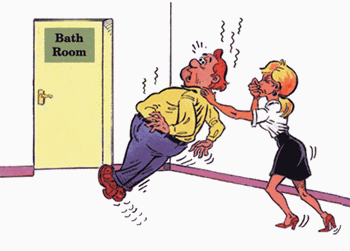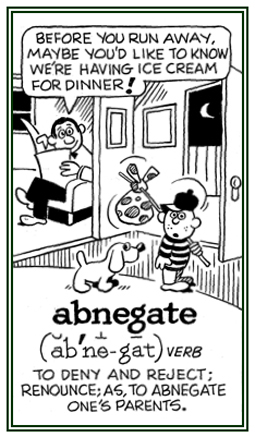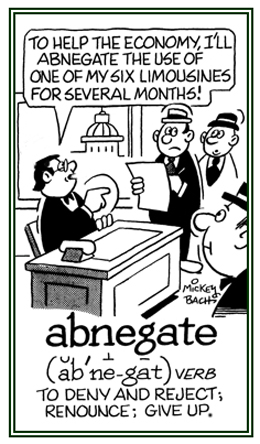a-, ab-, abs-
(Latin: prefix; from, away, away from)
This prefix is normally used with elements of Latin and French origins (abs- usually joins elements beginning with c, q, or t).
The form ab- is regularly used before all vowels and h; and it becomes a- before the consonants m, p, and v. The prefix apo- has similar meanings.
This list is a very small sample of the multitudes of a-, ab-, abs- prefixes that are available in dictionaries and those in this unit are only meant to present a few examples.
2. A mental illness in which patients are driven to repeat the same act, such as washing their hands, over and over again, usually for many hours: Some compulsive disorders, as indicated in ablutomanias, are often considered to be "obsessive-compulsive psychoneuroses".
Some ablutomanias are enormously time-consuming. A woman named Beth felt compelled to wash her hands in a certain way after touching "unclean" objects, namely from fingers to wrist, from wrist to elbow, and from elbow to upper arm, and then to repeat the performance several times until her anxiety was over. As a result, Beth's hands often became painfully raw.
Arthur had ablutomanias that involved washing in a certain ritualistic order whenever he had a bath or cleaned objects. He said, "When I wash clothes or clean anything—floor, carpet, windows, and so on—I have to clean them in a specific way to make sure I do not miss anything. I can never hurry because I would not feel that it has been done properly."


2. A dread of water or of being seen in the nude: Some people who have ablutophobias are overly anxious that their bodies will be criticized or compared with those of others, while some simply have an abnormal fear of being in warm or cold water.
The ablutophobias which Susan's sister suffered from, included being terribly afraid of going near swimming pools.
David's roommate at the university was ablutophobic which made living in the same room with him too difficult, so David made arrangements to move in with a non-ablutophobic student.
The department of psychiatry at t the hospital started a group program for ablutophobic individuals in hopes of generating a better solution for their psychological conditions.

The recent abluvion that was swept away by the flood included a picnic table.
All of the abluvions which had collected under the bridge were cleared away by the underwater divers.
The corrective surgery performed an abmortal relocation of the damaged nerves on Joe's foot. Joe was a long distance runner.
2. To deny something to oneself; to restrain, especially from indulging in some pleasure: The minister of the church abnegated the material luxuries of life.
When Agnes Marcia became a nun after the deaths of her son and husband in an auto accident, she was abnegating a life of comfort and ease in order to dedicate her life to God.
Indulging in an ice cream sundae abnegates the healthful effects of having a salad for lunch.
Because Lucy wants to lose weight, she is abnegating the consumption of so much food during her meals.


Go to this Word A Day Revisited Index
so you can see more of Mickey Bach's cartoons.
The vice principal's abnegation of her position to allow for the promotion of a younger person was admired by all.
The Board of Directors was faced with a couple of uncertainties regarding the abnegations of the entire staff at the shelter for women.
Samuel's sudden abnegation of a wild life to become a Christian missionary was a great surprise for everyone who knew him.
2. The denial and rejection of a doctrine or a belief: There are those who have an abnegation of the existence of God.3. Etymology: from Latin abnegare, "to refuse, to deny"; from ab-, "off, away from" + negare, "to deny".

Go to this Word A Day Revisited Index
so you can see more of Mickey Bach's cartoons.
2. Unusual or unexpected, especially in a way that causes alarm or anxiety: The abnormal extremes in weather conditions are causing officials to declare mandatory evacuations which is resulting in a great deal of stress for residents in certain areas of the world.
3. Pertaining to something much greater than expected or usual: Abnormal profits might be blamed for the financial crisis that exists in the present time.
4. Regarding a departure from what is typical or what is usually expected, for example in intelligence and physical development: The parents were very distressed when they found out that their daughter was considered to be intellectually abnormal in school.
The abnormal circumstances surrounding Gertrude's decision to travel caused a great deal of concern for her parents.
The neighbor's cat has an abnormal fear of birds.
5. Etymology: This word was once spelled anormal and it came from the Greek anomalos, meaning irregular. Later the b was added by analogy with the Latin word for irregular, abnormis from Latin ab-, "from" + norma, "norm"; and so, "away from the norm".Abnormal can mean either "below normal" or "above normal"; so, either better or worse than normal: Einstein had an abnormal IQ while an ignorant person also has an abnormal IQ. On the other hand, "subnormal" always means below or worse than normal.
A clubfoot is an abnormality that can be surgically corrected or improved.
2. A feature or characteristic that is not usual or ordinary, especially something that is worrying or which shows that there may be something wrong or harmful: The dictionary lists several abnormalities which can be considered mental health issues.3. A difference in intelligence that falls outside the conventional range of intelligence: Greg's school is providing special classes for students with abnormalities who need special educational procedures.
2. An irregularity or monstrosity: The veterinarian recognized the abnormity of the birth of the calf when he saw that it had two heads.
In the past, traveling circuses often featured people and animals with abnormities which attracted the audiences into the special exhibitions.
The decision of the school principal to abolish cheerleaders during football games upset both parents and students.
The teacher abolished all the mathematical equations from the chalkboard when he wiped it clean.
People in Mark's neighborhood tried to abolish the noise made by other people's dogs during the night.
2. To do away with wholly; to annul; to make void; said of laws, customs, institutions, governments, etc., such as to abolish slavery, to abolish illegal drugs: The edict from the mayor's office abolishes the requirement to license pets.Some people are trying to abolish the death penalty.
3. To put an end to, or to destroy; such as, physical objects; to wipe out: In his famous speech, the president abolished the use of the term "freaks" when referring to individuals with abnormalities in circuses and carnivals.4. Used especially in legal circles to indicate the annulment of a law: Compulsory military service in the United States has been abolished, so the services now have volunteers as members.
5. Etymology: borrowed from Middle French aboliss-, stem of abolir, "to abolish, to do away with"; a borrowing from Latin abolere, "to cause to die out, to retard the growth of" from ab- "from" + -adolere, "to grow, to nourish" and is said by some etymological sources to be related to adolescere, "to grow up".
The antiquated system of managing public transportation is an abolishable system so it should be replaced.
The mayor and his deputies were considered abolishers of good community assets, such as the library.


